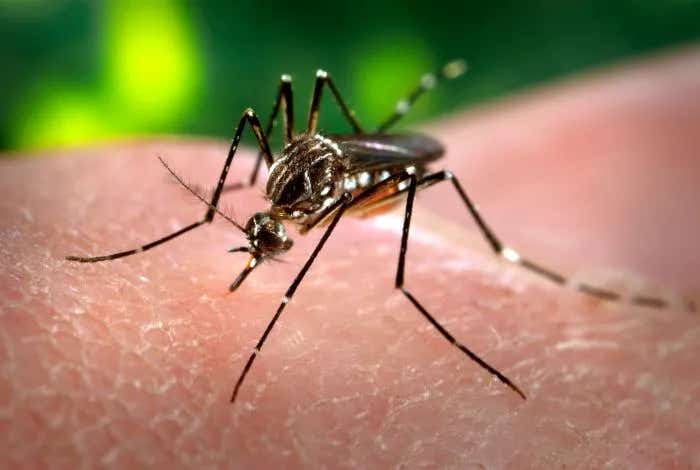Lifesaving rheumatoid arthritis vaccine could transform treatment worldwide
Researchers develop a groundbreaking vaccine for rheumatoid arthritis, showing promise in prevention and improved bone health.

The protein-based vaccine shows significant promise in preventing rheumatoid arthritis and improving bone quality — suggesting long-term benefits following immunization. (CREDIT: CC BY-SA 4.0)
Rheumatoid arthritis is a painful and disabling autoimmune disease that affects more than 1% of people worldwide. In the United States alone, it disrupts the lives of about 1.3 million people. The disease begins when the immune system wrongly attacks healthy tissues, especially the joints, causing swelling, stiffness, and lasting pain. As it progresses, it can make even simple movements difficult, taking a serious toll on daily life.
While treatments are available, they often come with harsh trade-offs. Many reduce inflammation but raise the risk of infection. No treatment stops the disease entirely. That’s why new research from the University of Toledo’s College of Medicine and Life Sciences is making headlines. The research team may have discovered a way to stop rheumatoid arthritis before it starts.
Dr. Ritu Chakravarti and her team have spent years studying a protein called 14-3-3 zeta. Their research led to the development of a new experimental vaccine that shows promise in preventing the disease. “Much to our happy surprise, the rheumatoid arthritis totally disappeared in animals that received a vaccine,” said Chakravarti.
The study, recently published in Proceedings of the National Academy of Sciences, reveals that the vaccine triggers a strong immune response. Instead of worsening inflammation, it protects against arthritis. Even more surprising, the vaccine also boosts bone strength—a major win, since arthritis often weakens bones over time.
Surprising Breakthroughs and Fresh Possibilities
At first, the team thought 14-3-3 zeta might help cause the disease. They removed the protein from lab animals using gene-editing tools, expecting symptoms to improve. Instead, the animals developed aggressive, early arthritis. That twist revealed something important: the protein doesn’t trigger the disease—it helps control it.
That accidental insight changed everything. “Sometimes there is no better way than serendipity,” said Chakravarti. “We happened to hit a wrong result, but it turned out to be the best result. Those kinds of scientific discoveries are very important in this field.”
Using that knowledge, the team created a vaccine with purified 14-3-3 zeta protein grown in bacteria. In animal tests, it not only stopped arthritis from developing, it also improved long-term bone quality. If further trials confirm these effects in humans, the vaccine could offer a new way to manage—if not entirely prevent—one of the most stubborn autoimmune diseases.
Related Stories
The 14-3-3 zeta protein acts as an adapter in cellular signaling, interacting with a range of other proteins. It plays roles in cancer, cardiovascular diseases, and immune response regulation. Earlier studies identified its involvement in T-cell polarization and inflammatory processes, making it a logical target for autoimmune disease research.
The University of Toledo’s findings highlight 14-3-3 zeta’s function as a suppressor of inflammatory arthritis. In experiments, rats genetically modified to lack this protein developed severe joint inflammation, bone loss, and weight reduction. Conversely, immunizing animals with the protein during early disease stages reduced joint inflammation, improved collagen production, and preserved bone quality.
The vaccine suppressed levels of interleukin-1 beta (IL-1β), a key inflammatory cytokine, while increasing anti-inflammatory responses. Importantly, this immunization approach stimulated the production of antibodies targeting 14-3-3 zeta, providing a protective effect that traditional therapies could not achieve. Unlike passive antibody treatments, the active immunogenic response was essential for arthritis suppression.
Implications for Future Treatment
Rheumatoid arthritis treatments currently focus on reducing symptoms and slowing disease progression. Corticosteroids, immunosuppressive drugs, and biologics targeting specific inflammatory pathways offer some relief. However, these approaches can compromise the immune system, leaving patients more susceptible to infections, and are often costly.
Dr. Chakravarti’s vaccine represents a novel strategy. By addressing the disease’s underlying immune dysfunction, it may prevent or significantly reduce its impact. “Our approach is completely different,” she explained. “This is a vaccine-based strategy based on a novel target that we hope can treat or prevent rheumatoid arthritis. The potential here is huge.”
The team has filed for a patent and is seeking pharmaceutical partners to support safety and toxicity studies. These steps are critical for advancing toward preclinical trials and eventually human applications. While challenges remain, the vaccine’s ability to improve bone health adds another layer of promise for long-term benefits.
The discovery underscores the importance of basic scientific research and the role of unexpected findings in advancing medical knowledge. It also highlights the potential for antigen-specific immunotherapy in autoimmune diseases. While similar approaches are being tested in clinical trials, the use of 14-3-3 zeta offers a unique mechanism for restoring immune balance.
The vaccine’s success in animal models paves the way for new treatments not just for rheumatoid arthritis but possibly other autoimmune diseases. The findings demonstrate how autoantigens, like 14-3-3 zeta, can play dual roles—triggering and suppressing disease—depending on how the immune system is engaged.
Dr. Chakravarti’s work represents a major step forward in autoimmune disease treatment. If successful in humans, this vaccine could redefine how rheumatoid arthritis is managed, offering hope to millions worldwide.
Symptoms of Rheumatoid Arthritis
According to the Mayo Clinic, signs and symptoms of rheumatoid arthritis may include:
- Tender, warm, swollen joints
- Joint stiffness that is usually worse in the mornings and after inactivity
- Fatigue, fever and loss of appetite
Early rheumatoid arthritis tends to affect your smaller joints first — particularly the joints that attach your fingers to your hands and your toes to your feet.
As the disease progresses, symptoms often spread to the wrists, knees, ankles, elbows, hips and shoulders. In most cases, symptoms occur in the same joints on both sides of your body.
About 40% of people who have rheumatoid arthritis also experience signs and symptoms that don't involve the joints. Areas that may be affected include:
- Skin
- Eyes
- Lungs
- Heart
- Kidneys
- Salivary glands
- Nerve tissue
- Bone marrow
- Blood vessels
Rheumatoid arthritis signs and symptoms may vary in severity and may even come and go. Periods of increased disease activity, called flares, alternate with periods of relative remission — when the swelling and pain fade or disappear. Over time, rheumatoid arthritis can cause joints to deform and shift out of place.
Note: Materials provided above by The Brighter Side of News. Content may be edited for style and length.
Like these kind of feel good stories? Get The Brighter Side of News' newsletter.



